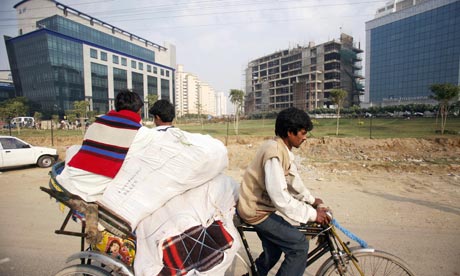Rather than emulate US swagger, my home country should learn a lesson from America's current jobs crisis

Prosperity for some: a man cycles past offices near New Delhi. Photograph: Manpreet Romana/AFP/Getty Images
The people I met ranged from extremely wealthy businessmen, part of a super-elite, to the salaried middle classes. When I encountered them as individuals, usually in extended sessions, they often showed themselves capable of nuance and even outright contradiction, from the government official who expressed understanding for ultra-left guerrillas fighting the government and mining corporations in central India to the waitress at an upscale Delhi restaurant who wished, despite her apparent upward mobility, to have her mother's less affluent but stable life as a provincial schoolteacher.
But what was apparent in my long conversations with individuals was hardly ever true in the aggregate. In the public discourse produced by the upper and middle classes in India – in newspapers and talk shows, in tweets and television soaps, in the comments that flood websites should anyone dare make a dissenting note – such contradictions vanish, replaced by an uncomplicated, almost cultish faith in India as a success story. In this version of contemporary India, the material wealth of the upper and middle classes can only keep on increasing. The comfortable will get rich, the rich get richer. As for the poor living on 50 cents a day (perhaps as much as 77% of the entire population, according to one government report), they might see their lot improve. If not, they have only their lack of ability, effort and merit to blame.
In fact, when a series of scandals exploded in 2010, the elite response involved fixating on the corruption of government and politicians. It is true that both government officials and politicians were involved in the scandals, which included the shoddy construction of buildings for the Commonwealth Games and the irregularities involved in auctioning off the mobile phone spectrum that may have cost the public exchequer $39bn. But although corporations and the media were quite complicit in such corruption, as evident from the last of the 2010 scandals, which involved the income tax department's wiretaps on a British-Indian corporate lobbyist called Niira Radia, their role vanished in the anti-corruption movement led by Anna Hazare last year.
Along with the corporations and the media, India's middle and upper classes were particularly eager supporters of Hazare, a former soldier and social reformer whose primary demand was for the creation of a Jan Lokpal, a tribunal that would have policing powers over the government and legislature. When rallying behind Hazare, elite Indians did not raise questions about inequality, in the way their country lags behind other poor countries in many social indicators, including the child mortality rate, underweight children and female youth literacy, or how large sections of the population from Kashmiris in the north to tribal people in the central Indian state of Chhattisgarh feel the state as nothing but an oppressive presence.
Those supporting the Hazare movement seemed unconcerned with such things, instead focusing on government corruption as all that stood between their present wellbeing and future prosperity. If only the corrupt state would step aside in certain areas – obviously not Kashmir, Chhattisgarh or the north-east – the Indian elites could prosper even further.
The Hazare movement has since petered out, but its central idea, of the unique meritoriousness of the middle and upper classes of India, remains. It is an illusion, and it reminds me of the illusion among the middle and upper classes of another society, and that is the US. I live and teach in New York, where I've seen among my students (mostly white, just as elites in India tend to be mostly upper caste) and in the Occupy Wall Street movement an elite that has suddenly been forced to examine its notions of unique meritoriousness and endless prosperity.
The lack of jobs in the US, something that earlier affected only those in manufacturing and the service industry, and therefore had an impact mostly on inner city African Americans, poor immigrants and rural whites, has now worked its way into the lives of the middle and upper classes, towards even people with expensive college degrees.
In the conversations I've had with members of this American middle class, I've been privy to another reality behind their seemingly affluent facades. I teach writing, and so I've read, with surprise, about a student whose past consisted of private school education, a large suburban house, well-paid professional parents, and global travel, but whose parents are now unemployed, their large house caught up in endless mortgage payments, and where, along with attending classes, it is equally important for this student to scrounge for a subway card and food. It's not just the young who are afflicted, either. On New Year's Eve, an old friend of mine showed me around the house he'd fixed up painstakingly over the years. He now plans to sell it off because, in spite of having a steady job, he can no longer keep up with the mortgage payments.
It's painful to see people struggling with such hopelessness. Yet I can't help but note that it's allowed a significant portion of Americans to shed their shell of complacency, their belief that they must continue to prosper because they are deserving and that the world of the marketplace will always deal them a fair hand. In India, the elites shout themselves hoarse about emulating America – in its wealth, its swaggering confidence, its Hummers and parking lots – even as that America ceases to exist. Even in the land of manifest destiny, destiny has run into its limits, and it seems only a matter of time before the same turns out to be true for India's privileged classes.
